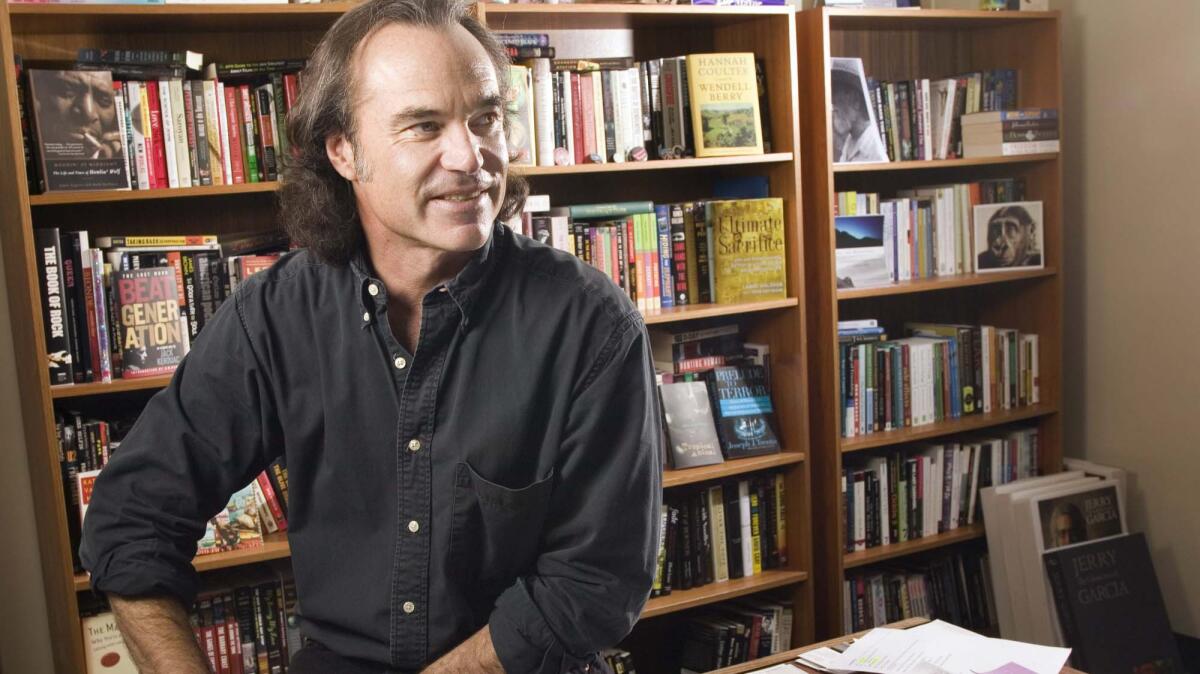Counterpoint hands the keys to Catapult

- Share via
One of the largest literary publishers of the West — west of the Hudson River, Counterpoint’s Charlie Winton points out, that doesn’t operate as a nonprofit — has merged with fledgling New York publisher Catapult. When the companies announced the deal earlier this month, it came as a surprise. What is technically a merger will, in effect, transport ownership of Berkeley-based Counterpoint to Catapult, based in New York.
“Thirty-nine years of this was fun, but it’s time for somebody else to take the reins, time for me to hand over the keys,” Winton said when reached at his office in Berkeley. Over the years, Winton has headed up various publishers and navigated a number of deals, always keeping his attention focused on literature. “Each book has been its own adventure,” he says.
For the record:
1:19 a.m. May 21, 2025A previous version of this story quoted Andy Hunter saying he has worked with Elizabeth Koch for eight years; they have worked together for two years.
Current books on Counterpoint’s list include the powerful debut novels “Grace” by Natashia Deón and “The Lightkeepers” by Abby Geni, the history “Water and the California Dream” by David Carle and Tod Goldberg’s “Gangsterland,” a thriller about a mob hit man who transforms into a Las Vegas rabbi to save his skin. Two perennial Counterpoint authors include Wendell Berry and Pulitzer Prize-winner Gary Snyder, both known for writing both poetry and prose.
Catapult’s publisher and chief operating officer Andy Hunter praised the press. “Counterpoint is the quintessential indie publisher,” Hunter said. “It seemed like a good fit.” Reached by phone at his Brooklyn office, Hunter was preparing to leave for a Brooklyn Book Festival party, which Catapult was helping to throw.
Less than 2 years old, Catapult has major ambitions for a new independent publisher: it plans to release a dozen books a year, concentrating (so far) on literary fiction and memoir. Its editor in chief, Pat Strachan, is widely respected in the industry, and in its highest mark of achievement, it brought writers Seamus Heaney and Czeslaw Milosz to Farrar, Straus and Giroux, before they won Nobel Prizes. Catapult has expanded is offerings beyond a traditional publisher with an online community and literary magazine, along with writing classes that take place online and at Catapult’s offices.
The resources behind these start-up efforts, including the merger, come from Elizabeth Koch, a longtime quiet literary supporter who stood front and center last year when Catapult was profiled in the Wall Street Journal. Koch, the daughter of industrialist Charles Koch, has an MFA in creative writing from Syracuse University, where she studied with George Saunders.
“I’ve been working with Elizabeth for two years,” Hunter says. “I really think she’s great. She’s a real passionate advocate of literature in a way that inspires me.”
The long publishing history Counterpoint has with Berry and Snyder — and departed writers such as James Salter, Evan S. Connell and M.F.K. Fisher — made it an attractive property for a relatively new publisher. Older titles by these authors constitute a backlist — books that, with any luck, find an audience year after year. An enduring example is Harper Lee’s “To Kill a Mockingbird”; one week in late August, the book, originally published in 1960, sold 17,905 copies, making it the ninth-biggest-selling book in America, according to Publishers Weekly (that title, however, is published by Grand Central).
The way Winton calculates it, Counterpoint’s backlist will allow Catapult to be a functioning publisher early, relieving the pressure to have its new books start making a profit right away. “Not having to have your frontlist support you, it moves their organization ahead five, seven years,” Winton said.
Hunter, the new Counterpoint publisher, will stay in New York, where he also heads up the online magazine Electric Literature and the book news website Literary Hub. With Catapult, that makes three major literary ventures he’s launched in seven years.
“Andy Hunter impressed me,” said Winton. “I could see the energy, passion, the willingness to go slightly outside of the box, a risk-taker without being insane about it — that’s important in a challenging marketplace.”
Catapult will be making one major change from the start: it will move Counterpoint’s imprint Soft Skull from California back to New York. Founded with a radical ethos in 1992, the New York-based Soft Skull was purchased by Counterpoint in 2007 and transferred to the Bay Area in 2010, where it had been an uneasy fit.
“I always had great love for Soft Skull,” said Hunter, who has talked to its former editors Richard Nash and Denise Oswald. He notes that Soft Skull could be more Internet-savvy, and on the Internet “there are so many great voices that are interesting, transgressive.” Catapult’s Yuka Igarashi will become Soft Skull’s editorial head.
With Hunter as publisher of Counterpoint, oversight will fall to Catapult’s Jennifer Abel Kovitz, based in Portland,Ore. (Koch won’t be involved in the day-to-day Counterpoint operations.)
Winton isn’t leaving Counterpoint completely behind; he will remain an editor at large. But before he undertakes another book project, he is looking forward to making time to play guitar.
More to Read
Sign up for our Book Club newsletter
Get the latest news, events and more from the Los Angeles Times Book Club, and help us get L.A. reading and talking.
You may occasionally receive promotional content from the Los Angeles Times.








